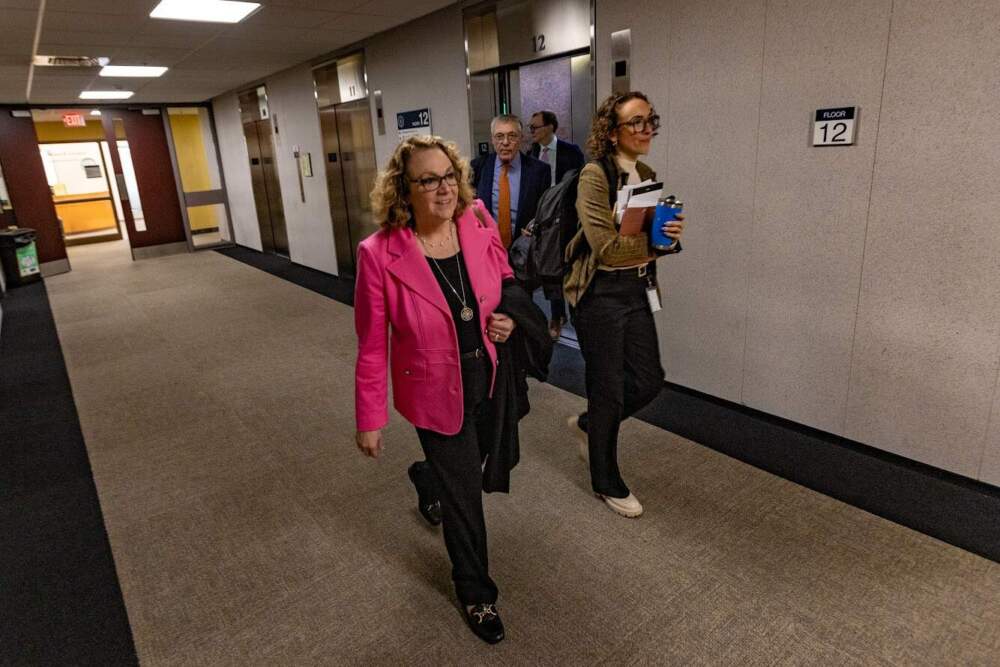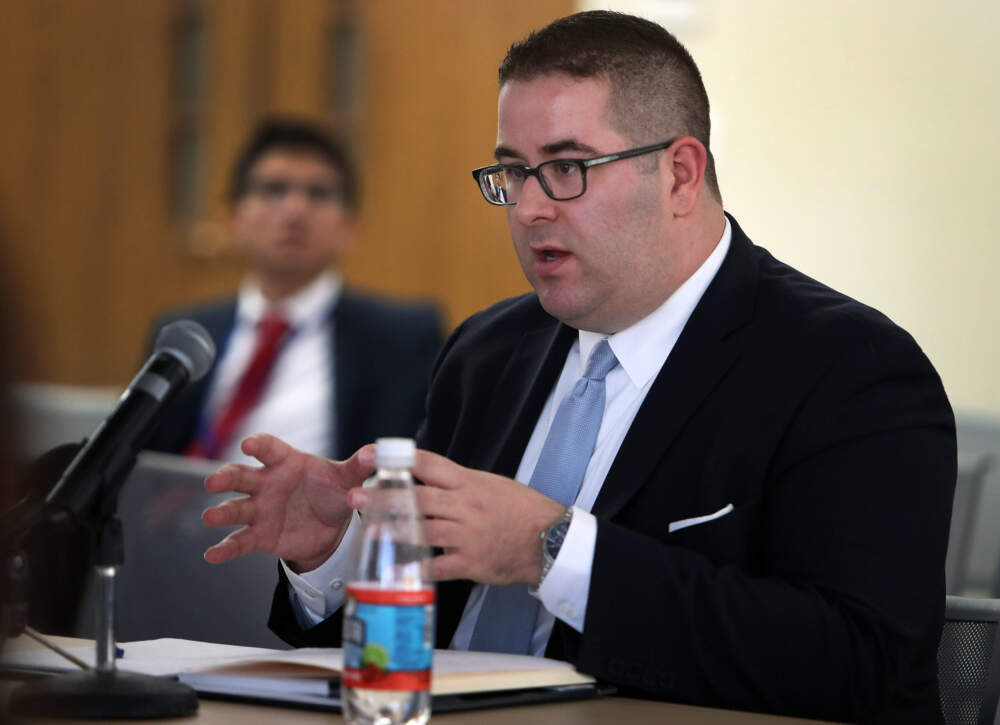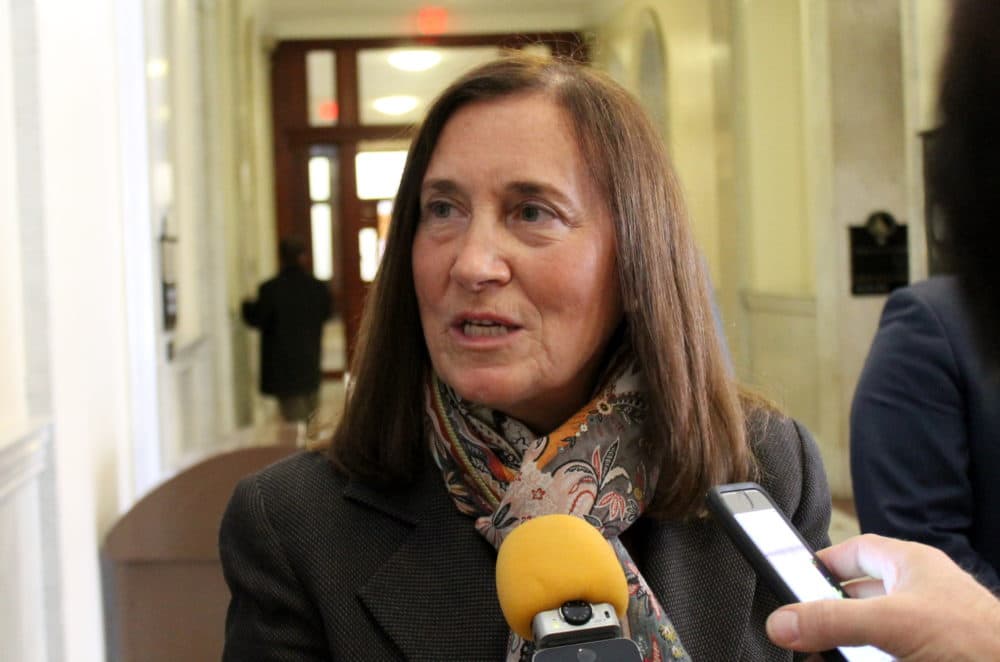Advertisement
Former women staffers allege they were bullied at embattled Cannabis Control Commission
ResumeThree former high-level staffers at the state’s Cannabis Control Commission say they suffered workplace bullying by the agency’s communications chief, adding to a growing list of complaints about a toxic culture and poor management inside the embattled agency.
The former employees, all of whom are women, say they were pushed out or chose to leave between 2019 and 2021 because of harassment by Cedric Sinclair. He went on to receive a promotion and raises, state records show, until he was suspended last December.
Human Resources Director Justin Shrader was suspended at the same time. The commission has not provided a public explanation for the two suspensions.
The reports of bullying by Sinclair are the latest example of chaotic and bitter dealings at the commission tasked with overseeing the state’s $6 billion marijuana industry. And for the women, there was also hypocrisy, they say: an agency that professes to be devoted to equity in public allegedly did not stand up for employees in private.
Sinclair referred questions to his lawyer, who declined to comment on the record. Shrader did not return requests for comment; he resigned soon after his suspension.
The commission’s chair, Shannon O’Brien, also is currently suspended and publicly feuding with state Treasurer Deborah Goldberg, who appointed her but is now holding closed-door hearings that could end in O’Brien’s firing.

The former women staffers who complained about Sinclair all spoke on the condition of anonymity for fear of professional reprisal. They described a toxic workplace environment where Sinclair allegedly belittled and antagonized women who worked for and alongside him.
One staffer resigned in 2021, after the commission cleared Sinclair of wrongdoing in a complaint she filed against him, according to emails provided to WBUR.
“Your Chief of Communications continues to emotionally abuse, sabotage, and gaslight Black and Brown women,” she said in a resignation letter reviewed by WBUR.
“I cannot go unsupported any longer and I refuse to work for an agency that promotes abuse, especially amongst their leadership,” she wrote.
Another former employee, who held a director-level position, said she felt Sinclair acted like he had “a position of power over women in the workplace, and that's who he subjected to his abuse, to his bullying.” That employee quit in 2020.
Advertisement
These and other allegations of dysfunction within the commission are drawing scrutiny from state officials.
State Sen. Michael Moore, who represents the 2nd Worcester District, in an interview said his office also separately received a complaint from a woman alleging a hostile work environment at the commission. He said while some applaud the seven-year-old agency for regulating a newly legal industry, “If you actually dig down and see what's happening on the day-to-day from the people who are interacting with them — perception is not reality.”
A pattern of complaints
WBUR spoke to each of the three former employees in separate interviews, and reviewed text messages and emails from the time of their employment. Some aspects of their accounts could not be independently corroborated because they involve private personnel records.
In a statement, a spokeswoman for the commission said the agency "does not comment on internal personnel matters." She said it "continues to investigate human resources allegations and complaints as they arise and takes the necessary and appropriate actions commensurate with findings and consistent with agency policies."
Sinclair was a major force within the cannabis commission, according to several people who worked with him. One of the agency’s early employees, his role as head of communications grew to encompass not only media relations, but government affairs, “equity programming” and community outreach, according to his LinkedIn profile.

All three women who spoke to WBUR described instances where they said they turned in work to Sinclair, only for him to claim he hadn’t received it and blamed them for missed deadlines. When he’d get angry, he would shout and sometimes bang his fists on the table, they said.
The female director who worked alongside Sinclair before resigning in 2020 claimed that in one incident, he asked her to step outside the building and then yelled at her.
“It was just really aggressive, one on one, outside, on the street. Very unprofessional,” she said in an interview. She quit largely due to Sinclair’s behavior, she said.
Another woman, who worked in communications under Sinclair, said she went to then-Executive Director Shawn Collins with a verbal complaint about Sinclair in the spring of 2019. Not long after that, she said, Sinclair brought her alone into a conference room. He appeared to be furious, she recalled, and she felt afraid.
She left the agency about a month later, she said.
The third woman, who also held a director-level position, described experiencing panic attacks she said were fueled by Sinclair’s bullying at work. Emails show she applied for medical leave and filed an official complaint against Sinclair with human resources in the spring of 2021.
The emails provided to WBUR show the commission hired an outside investigator to review the woman’s complaints. The investigator concluded there was “no violation of the Commission’s policies,” according to an email from human resources describing the findings.
The female director resigned a few days later.
“The mistreatment of Black and Brown women who carried equity on their back while fighting tooth and nail for even the most minute of resources,” she wrote in an email to commission leadership, “has proven to me that the agency is more concerned with optics than reality.”

Collins was executive director of the commission, in charge of daily operations, at the time of each of the complaints. He joined the agency in 2017, at its founding, after serving as a deputy to Goldberg, the state treasurer. He left the commission in December and is now an industry consultant.
Reached by phone, Collins said he could not comment on commission personnel matters. He responded with a hypothetical – that if he had heard complaints, “out of obligation” and “as a matter of policy” he would have referred them to the “appropriate office” to investigate. He would not say whether he’d heard the women’s complaints or if he acted on them.
A spokesman for Goldberg declined to comment.

The Cannabis Control Commission did not respond to questions about whether Sinclair was ever disciplined as a result of complaints against him. State payroll data show he was promoted from communications director to chief communications officer in 2020. Sinclair’s new position came with a $13,000 pay bump, to $141,831.
A commission in ‘crisis’
The former staffers’ stories are among numerous allegations of a toxic and chaotic environment within the roughly 130-person Cannabis Control Commission.
State Sen. Moore wrote a public letter to the state auditor’s office in September calling for an investigation into allegations of a “hostile” work environment. “If these allegations are out there, they should be investigated, promptly,” Moore said in an interview with WBUR last week.
A spokesperson for State Auditor Diana DiZoglio said her office recently completed a performance audit of the commission and “found matters of concern.”
“We are working on conducting another audit of this agency to address concerns that have recently presented themselves,” Andrew Carden, director of operations for the office, said in a statement.
Moore also filed a bill that would establish a special audit unit within the Cannabis Control Commission. That legislation is pending.
Meanwhile, the high-stakes disciplinary hearings over whether suspended commission Chair Shannon O’Brien will keep her job continue to play out behind closed doors. A third hearing is scheduled for Friday.
O’Brien has been accused of mistreating an employee and making racially insensitive remarks. A former Massachusetts state treasurer herself, O’Brien denies wrongdoing and is fighting to keep her job. In a public meeting last July, she called the commission an agency “in crisis,” due to a host of employee departures and vacant posts.
The commission has paid out more than $240,000 to its suspended officials since September, according to state payroll data. The agency is still recruiting a new executive director; it says more than 100 people have applied for the job, overseeing its dozens of employees and a budget of nearly $20 million. At a public meeting last week, commissioners broke into a protracted argument around a motion to take power away from the acting executive director during the recruiting process.
Whoever takes the role may face considerable lingering culture challenges at the agency.
“Folks in leadership had the opportunity to make a change or to make an impact, or even just to validate that this was happening,” said the former director-level staffer who left in 2021. Instead, she added, they’ve “chosen over and over and over again not to.”
Correction: This story has been updated to correct the commission's total number of employees. It is 130.
This article was originally published on May 31, 2024.
This segment aired on May 31, 2024.
